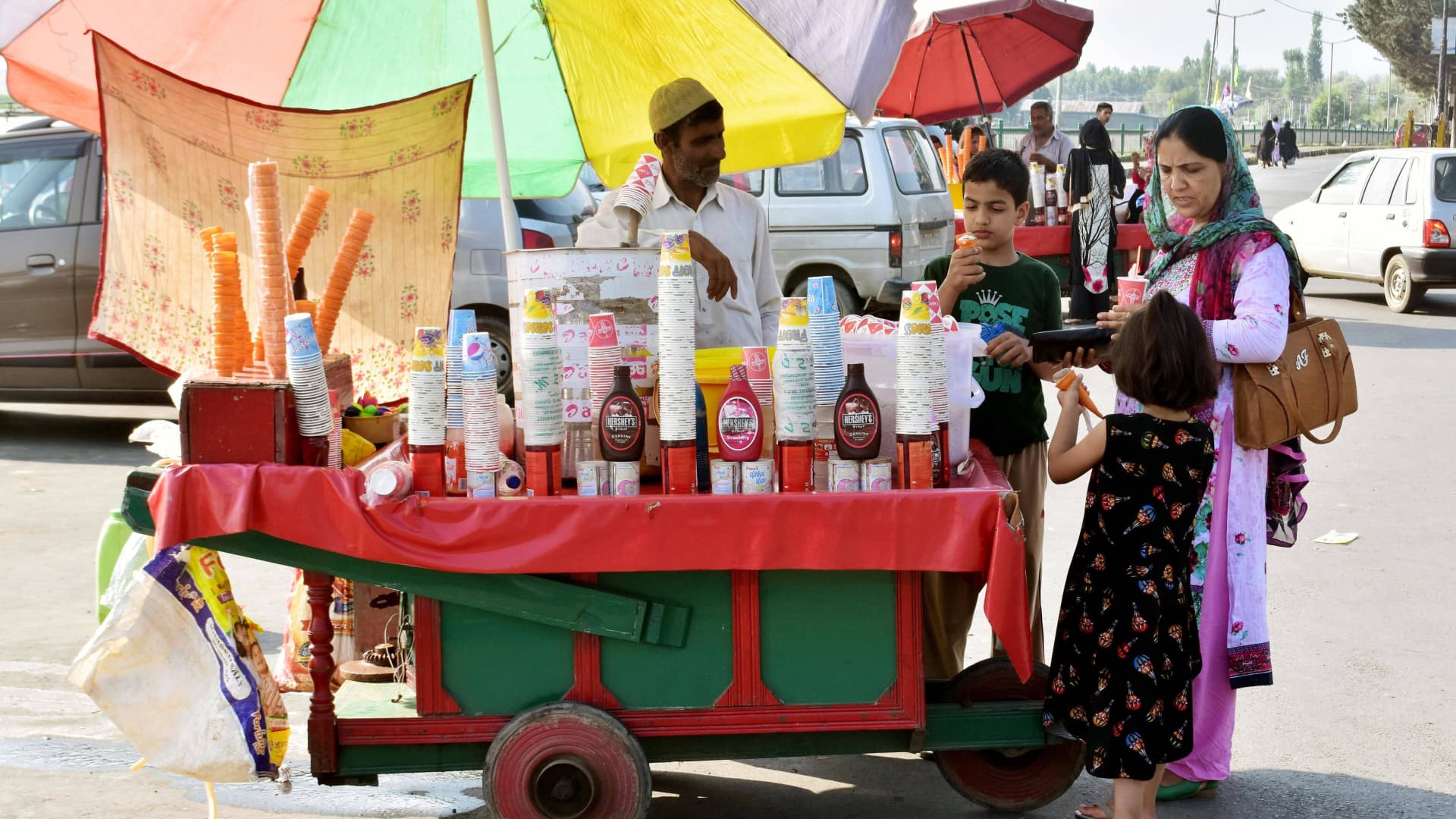Pedestrians enjoying ice-cream on a hot summer day in Srinagar, Indian administered Kashmir.
Sopa Images | Lightrocket | Getty Images
Asia is in the grip of a scorching heatwave.
With temperatures hitting all-time highs, consumers are turning to ice cream and chilled drinks to beat the heat — and analysts say some sectors could benefit.
“We’d expect the heatwave coming to Asia will have similar effects on purchasing as we observed in other parts of the world, such as the UK mid last year where fan sales, air conditioning units at home rose, and ice creams, beach equipment, coolers for out-of-home picked up,” said Bain & Company’s Associate Partner Zara Lightowler.
Several Southeast Asian cities hit record high temperatures in May as global climate change exacerbates heat waves and air pollution in the region.
The blistering temperatures this year can be attributed to a combination of factors, including lower rainfall over the past winter and El Niño, a weather phenomenon that typically brings hotter and drier conditions to the region.
Drinks, ice cream and fans
Certain consumer goods could benefit. Soft drink companies could see more prominent advances.
In Southeast Asia specifically, analysts expect bottled water and drinks to see an uptick in sales.
“An ice-cold carton of soya milk can work wonders when the temperature is rising,” said Kuo, highlighting Hong Kong’s Vitasoy International and soft drink giants like Coca-Cola and PepsiCo.
Shares of PepsiCo are up 18.5% in the last 12 months, while Coca-Cola is higher by 3.8% in the same period.
A street vendor selling bottles of chilled water amid high temperatures in Dhaka, Bangladesh, on Tuesday, June 6, 2023.
Bloomberg | Bloomberg | Getty Images
“Another consumer goods company that could benefit is Unilever which makes Walls range of ice cream,” said David Kuo, co-founder of The Smart Investor.
Air-conditioners and fans could also see a boost in sales.
“Use of air-conditioning will skyrocket, benefiting the HVAC industry but leading to extremely high levels of energy usage,” said Allison Malmsten, public research director at Daxue Consulting.
Kuo also mentioned that fans could be “an affordable and more sustainable way than aircons to stay cool in warm weather.”
Crops and cattle
Crop prices could also rise due to the extremely dry conditions, driven higher by declining crop yields such as rice, soy, wheat, corn — and even tea leaves.
Cattle feed is commonly made up of corn, wheat, rice and oats, amongst other grains, a lot of which saw large spikes in the middle of last year and remain notched at heightened levels.
That means the cost of cattle feed could go up, consequently raising the price of meat as well, said Daxue Consulting’s Malmsten.
Severe weather conditions recently fueled concerns that coffee beans in certain major coffee producers could be hit. Rice, a particularly vulnerable crop consumed by billions across the globe, was also not spared.
Cattle feeding at a cattle farm on December 13, 2020 in Pingliang, Gansu Province of China. Cattle feed is commonly made up of corn, wheat, rice and oats, amongst other grains, a lot of which saw large spikes in the middle of last year and remain notched at heightened levels.
Vcg | Visual China Group | Getty Images
Other crops that could see gains include tea leaves and palm oil.
“Looking down the road we can expect the heatwave to have an impact on yields for example impacting tea harvests in Laos, palm oil in Malaysia, ultimately risking further price increases,” Bain & Co’s Lightowler estimates.
Sustainability in focus
Sustainability-related products are also expected to ride on the heatwave gain, Lightowler added, as environmentally-mindful consumers start turning to more sustainable products while assessing the impact of their personal choices on climate change.
“As people start to experience extreme weather conditions and connect that back to climate change, we expect to see greater ESG awareness supporting the structural shift to sustainable buying across Asia,” she said, referring to environmental, social and governance factors that are being considered.
Malmsten also said that extreme weather could draw more attention to the urgency of solving the climate crisis, hence benefiting the development of sustainable industries and products.

